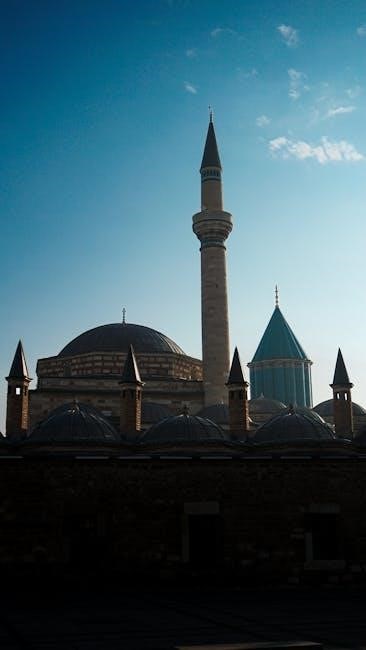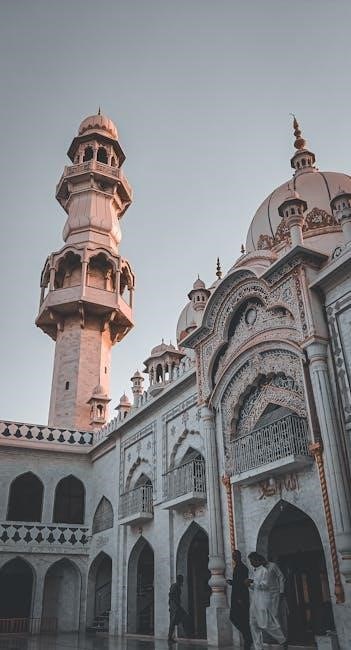
-
By:
- dane
- No comment
muslim history pdf
This section introduces the significance of Muslim history PDFs, offering a comprehensive overview of Islamic civilization’s development and key events shaping the Muslim world․
1․1 Overview of Islamic History
Islamic history spans over 1,400 years, tracing the rise of a global civilization rooted in Arabia․ It details the life of Prophet Muhammad (PBUH), the Hijra, and the expansion of Islam, highlighting key events, cultural achievements, and the preservation of knowledge that shaped the Muslim world․
1․2 Importance of Studying Muslim History
Studying Muslim history provides insights into the cultural, religious, and intellectual contributions of Islamic civilization․ It helps understand the global impact of Islam, counter misconceptions, and appreciate the legacy that shaped modern societies, fostering cross-cultural understanding and historical awareness․
1․3 Key Themes in Muslim History PDFs
Muslim history PDFs explore themes like the life of Prophet Muhammad, the Hijra, Rashidun Caliphate, Islamic expansion, and the Golden Age․ They highlight key figures, cultural achievements, and historical events shaping the Muslim world, offering insights into faith, governance, and civilization․

Early Islamic History
Early Islamic history explores the emergence of Islam in Arabia, the life of Prophet Muhammad, the Hijra, and the Rashidun Caliphate, laying the foundation for the Islamic faith and its expansion․
2․1 The Life of Prophet Muhammad (PBUH)
Prophet Muhammad (PBUH) was born in Mecca in 570 CE․ His teachings, revealed through the Quran, emphasized monotheism, justice, and compassion․ He faced persecution but remained steadfast, leading to the Hijra in 622 CE․ His leadership united Arabia, establishing a moral and legal framework that shaped Islamic civilization․
2․2 The Hijra and the Establishment of the First Muslim Community
The Hijra, Prophet Muhammad’s migration from Mecca to Medina in 622 CE, marked the birth of the Islamic calendar and the first Muslim community․ This pivotal event allowed Muslims to practice their faith freely, fostering unity and establishing a moral and legal framework under divine guidance․
2․3 The Rashidun Caliphate and the Expansion of Islam
The Rashidun Caliphate, under the leadership of Abu Bakr, Umar, Uthman, and Ali, oversaw the rapid expansion of Islam․ Their wise governance and military campaigns established a vast empire, spreading Islamic teachings across the Middle East, North Africa, and beyond, creating a unified Muslim state with a strong administrative foundation․

The Spread of Islam
Islam expanded rapidly through trade, cultural exchange, and conquests, spreading from Arabia to diverse regions, shaped by interactions with local cultures and the appeal of its teachings․
3․1 Conquests and the Islamic Empire
The Islamic Empire expanded rapidly through military campaigns and strategic alliances, conquering vast territories from Arabia to North Africa, Spain, and Central Asia․ Key cities like Makkah, Iraq, and Egypt fell under Muslim rule, establishing a vast empire that facilitated cultural and religious transformation across diverse regions under Islamic governance․
3․2 The Role of Trade and Culture in the Spread of Islam
Trade routes and cultural exchanges played a pivotal role in spreading Islam, as merchants and travelers shared Islamic teachings across diverse regions․ Cities like Baghdad and Damascus became hubs of learning, fostering the exchange of ideas and integrating Islamic values into local cultures, enriching global heritage through shared knowledge and traditions․
3․3 The Impact of Islamic Conquests on World History
The Islamic conquests facilitated the spread of knowledge, preserving ancient Greek and Roman texts while advancing science, medicine, and philosophy․ This cultural exchange significantly influenced the Renaissance and shaped global intellectual traditions, leaving a lasting legacy in world history․
Key Figures in Muslim History
Explore the lives of influential figures, including the Four Rightly Guided Caliphs, Umayyad and Abbasid leaders, and scholars who shaped Islamic civilization and thought․
4․1 The Four Rightly Guided Caliphs
The Four Rightly Guided Caliphs—Abu Bakr, Umar, Uthman, and Ali—played pivotal roles in shaping Islam’s early expansion and governance․ Their leadership, wisdom, and commitment to Islamic principles set the foundation for the Muslim community’s growth and prosperity, earning them revered status in Islamic history․
4․2 The Umayyad and Abbasid Caliphs
The Umayyad and Abbasid caliphs ruled during periods of significant expansion and cultural flourishing in Muslim history․ Their reigns saw vast territorial growth, administrative innovations, and a golden age of science and art, but also faced internal strife and eventual decline due to political and social challenges․
4․3 Influential Scholars and Thinkers in Islamic History
Influential scholars like Al-Bukhari, Ibn Sina, and Al-Ghazali shaped Islamic thought․ Their works in jurisprudence, theology, and science laid the foundations for Islamic intellectual traditions, inspiring future generations and preserving knowledge for centuries through their writings and teachings․

The Islamic Golden Age
The Islamic Golden Age witnessed remarkable advancements in science, philosophy, and culture․ Scholars like Al-Khwarizmi and Ibn Sina made groundbreaking contributions, while Islamic cities became hubs of learning and innovation․
5․1 Scientific and Cultural Achievements
The Islamic Golden Age saw pioneering advancements in science, mathematics, and culture․ Scholars like Al-Khwarizmi and Ibn Sina revolutionized algebra, medicine, and astronomy․ Cultural achievements included the preservation of ancient texts, fostering a legacy of knowledge and innovation that shaped global progress․
5․2 Contributions to Mathematics, Astronomy, and Medicine
Islamic scholars excelled in mathematics, astronomy, and medicine․ Al-Khwarizmi pioneered algebra, while Ibn Sina’s medical texts remained authoritative for centuries․ Astronomers like Al-Battani refined celestial calculations, and the translation of ancient texts preserved knowledge, laying foundations for the Renaissance and modern scientific advancements․
5․3 The Preservation and Translation of Knowledge
Muslim scholars preserved ancient Greek, Roman, and Persian texts, translating them into Arabic․ This effort, centered in institutions like the House of Wisdom, safeguarded knowledge and facilitated its spread across regions, fostering a cultural and intellectual revival that influenced the Renaissance and beyond․
The Decline of the Abbasid Caliphate
The Abbasid Caliphate’s decline stemmed from internal power struggles, regional fragmentation, and external pressures, including the devastating Mongol invasion, leading to its eventual political and territorial disintegration․
6․1 Internal Conflicts and External Pressures
Internal power struggles, regional divisions, and economic instability weakened the Abbasid Caliphate․ External pressures, including Mongol invasions and rival dynasties, further eroded its authority, leading to gradual political and territorial fragmentation․
6․2 The Mongol Invasion and Its Impact
The Mongol invasion devastated the Islamic world, destroying cities like Baghdad and disrupting trade networks․ The Abbasid Caliphate collapsed, leading to widespread political fragmentation․ The invasion caused immense cultural and demographic shifts, reshaping the Muslim world’s unity and stability for centuries․
6․3 The Fragmentation of the Islamic Empire
The Islamic Empire fragmented due to internal conflicts and external pressures, leading to the rise of regional dynasties․ This decentralization weakened central authority, fostering diverse political and cultural developments across the Muslim world while marking the decline of unified Islamic governance․
Modern Muslim History
Modern Muslim history explores the transition from colonialism to independence, the rise of nationalism, and contemporary challenges, shaping the Muslim world’s identity and global interactions today․
7․1 The Rise of Nationalism and Colonialism
Nationalism emerged in the Muslim world as a response to colonial domination, reshaping political and cultural identities․ European powers imposed their influence, leading to the decline of traditional empires and the rise of nation-states, profoundly impacting Muslim societies and their global standing․
7․2 The Impact of the Ottoman Empire’s Decline
The Ottoman Empire’s decline led to the fragmentation of Muslim territories, fostering colonial domination and the rise of nationalist movements․ This period marked the end of a unified Islamic political authority, reshaping Muslim societies and their engagement with the modern world․
7․3 Contemporary Issues in the Muslim World
Contemporary issues in the Muslim world include political instability, extremism, and socio-economic disparities․ The legacy of colonialism and nationalism continues to shape identities, while global challenges like extremism and governance crises demand urgent attention, alongside efforts to revive Islamic values and promote unity․

Sources for Muslim History PDF
Key sources include classical Islamic texts and modern PDF resources, offering insights into historical events, cultural developments, and scholarly contributions, ensuring accessibility and preservation of Muslim history for future generations․
8․1 Classical Islamic Historiography
Classical Islamic historiography includes seminal works by scholars like Ibn Khaldun and Al-Tabari, providing detailed accounts of Islamic civilization’s rise, expansions, and cultural developments․ These texts remain foundational for understanding early Muslim history and its intellectual legacy․
8․2 Modern Historical Accounts and PDF Resources
Modern historical accounts and PDF resources offer accessible insights into Muslim history, with works like “The New Cambridge History of Islam” providing comprehensive narratives․ Digital archiving ensures these texts are widely available, preserving Islamic heritage for contemporary readers and scholars alike․
8․3 Recommended Books on Muslim History
Recommended books on Muslim history include “The New Cambridge History of Islam” and “Lost Islamic History,” offering in-depth analyses of Islamic civilization․ These texts, available in PDF, provide insights into key events, figures, and cultural developments, making them invaluable resources for understanding Muslim heritage․
The Role of PDFs in Preserving Muslim History
PDFs play a crucial role in preserving Muslim history by enhancing accessibility and enabling digital archiving of historical texts․ They ensure that valuable Islamic literature remains widely available for future generations․
9․1 Accessibility of Historical Texts in PDF Format
PDFs have revolutionized access to historical Islamic texts, enabling easy downloading and sharing․ This format ensures that valuable works on Muslim history are readily available globally, preserving knowledge for future generations while maintaining clarity and readability across devices․
9․2 The Benefits of Digital Archiving
Digital archiving ensures the preservation of Muslim history PDFs, preventing loss and enabling global access․ It facilitates easy sharing, research, and long-term knowledge retention, while safeguarding historical texts for future generations․
9․3 Challenges in Maintaining Historical Accuracy
Maintaining historical accuracy in Muslim history PDFs requires careful verification of sources and context․ Challenges include potential biases, misinterpretations, and the need for reliable scholarly oversight to ensure authenticity and prevent misinformation in digital archives․
Muslim history PDFs offer invaluable insights into Islamic civilization’s legacy, highlighting its enduring impact on global knowledge and culture while ensuring accessible preservation for future generations․
10․1 The Legacy of Muslim History

Muslim history PDFs highlight the profound legacy of Islamic civilization, from its spiritual origins to its cultural and scientific advancements, emphasizing its enduring influence on global knowledge and societal progress across centuries․

10․2 The Relevance of Studying Muslim History Today
Studying Muslim history PDFs remains vital for understanding today’s global dynamics, fostering intercultural dialogue, and appreciating the contributions of Islamic civilization to science, art, and philosophy, ensuring a well-rounded perspective on historical and contemporary issues․
10․3 Final Thoughts on the Significance of Muslim History PDFs
Muslim history PDFs serve as invaluable resources, preserving Islamic heritage and making it accessible for global learners․ They facilitate education, foster understanding, and ensure the legacy of Muslim civilization endures in the digital age, bridging past and present for future generations․